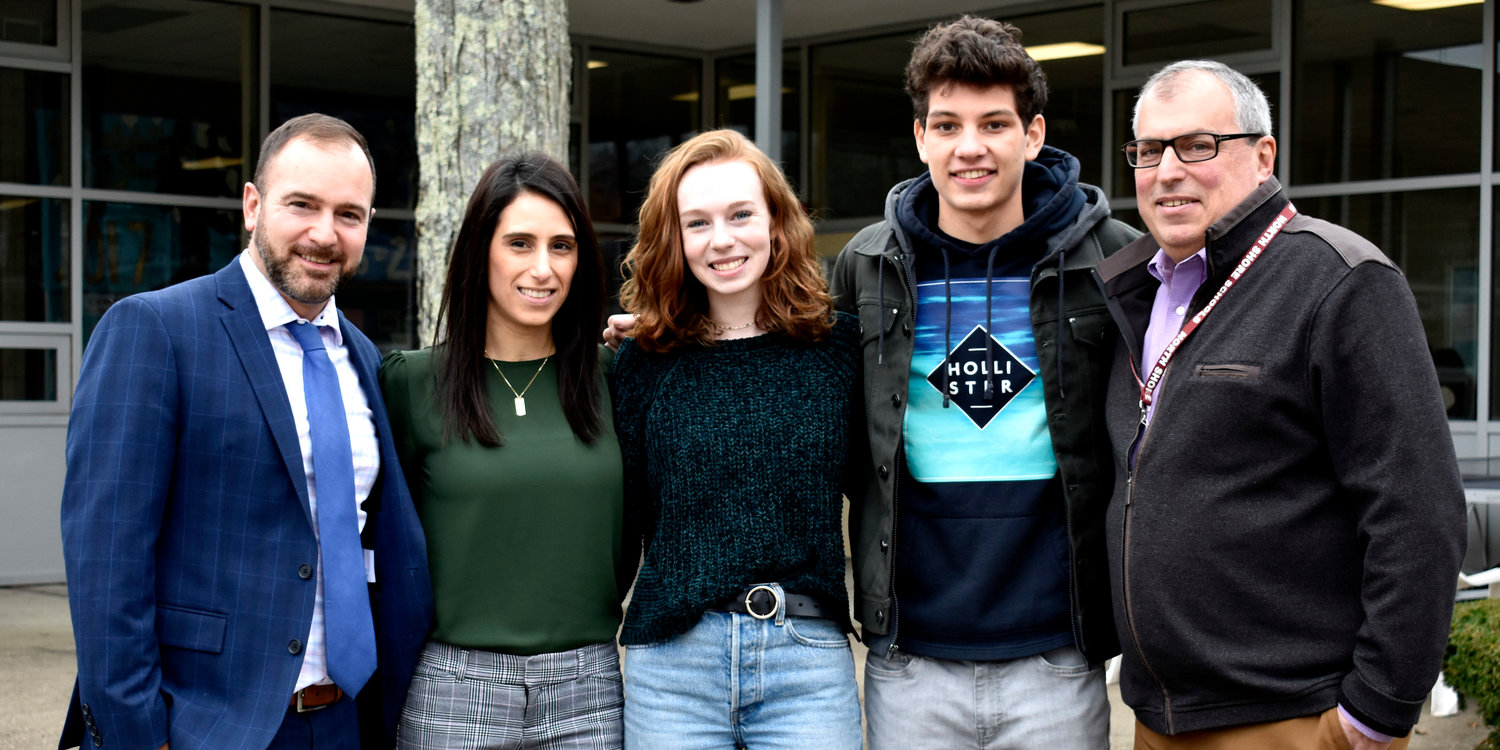North Shore High School seniors make science contest semifinals
Dr. Molly Mordechai couldn’t hold back her excitement when she found out that two of her science research students were semi-finalists of the Regeneron Science Talent Search. The North Shore High School teacher screamed in joy as she read the email and ran out of the classroom to catch one of those students, Keaton Danseglio, who had just left her class. He had just seen the email as well, and the two celebrated with a hug.
Danseglio and fellow senior Kyra McCreery were named as two of the top 300 nationwide entrants into Regeneron’s contest, one of the oldest and most prestigious science and math competitions in the country. Through their research class, they crafted their own projects aiming to make real impacts on the science community. As semi-finalists, their projects and 16-page papers will be reevaluated by Regeneron to see if they will be one of the 40 finalists to present their work at the company’s office in Washington, D.C. The results will be announced on Jan. 22.
“When I see them succeed,” Mordechai said, “I feel like a proud mom.”
Danseglio, 17, centered his project around epigenetics, or the science behind traits inherited by offspring due to experiences had by their parents without alterations to DNA. After watching a video on epigenetics in his AP biology class last year, he was fascinated by the subject and had many ideas of his own, but he realized many studies didn’t account for the exact causes of epigenetic differences. Through his project, he sought to develop a system to isolate specific variables related to these changes.
Using fruit flies as his main subjects, Danseglio sought to discover how stress put on fathers affects the fitness of their offspring. He devised a pair of stressors through which he put the paternal flies — heat shock and 24 hour starvation periods — and broke their future offspring into three groups. The first was a control group with offspring the fathers had before stressors. The next group, offspring the fathers had after one stressor, and the last group was made up of offspring had after two stressors.
Danseglio recorded how many of the flies were alive over certain periods of time — every four hours for starvation subjects and every two to 4.5 hours for heat shock subjects. This required him to wake up several times during the night and bring them everywhere he went. He laughed when he recalled that he once brought his flies to a party.
In all of his experiment groups, Danseglio found that offspring of stressed fathers had a more difficult time surviving the stressors, supporting his hypothesis. However, he still has more questions on the topic of epigenetics.
“The question I’m left with is the potential mechanism for why this is happening,” Danseglio said. “because it’s not fitness based on genetics, it’s fitness based on the paternal environment.”
Danseglio was mentored by LIU Post genetics professor Dr. Ted Brummel, who let the senior use his lab for the project. He also provided Danseglio with guidance, although he remained mostly hands off, something which Danseglio appreciated. Brummel said it’s important for scientists to make their own decisions and said that Danseglio did a great job with his project and is a brilliant scientist in the making.
“I’m a really big fan of this generation of kids,” Brummel said. “I think they’re hardworking, caring, responsible. I think he checks all those boxes.”
Mordechai said Danseglio is one of the most well-balanced students she has ever seen because he succeeds in the educational, social and personal aspects of high school. She said his project was fascinating and a great display of his wide range of ideas.
“I watched it unfold in front of my eyes every day,” Mordechai said, “and it was just so neat to see how creative and out of the box he was.”
McCreery, 17, has a passion for environmental science and wanted to focus her project on exploring the impact of climate change on the trajectory and nature of North Atlantic hurricanes. She spent months looking at a dataset of 1,857 tropical storms occurring in North America and the Caribbean, dating from 1851 to 2016 with the guidance of her mentor Dr. Upmanu Lall, chair of Columbia University’s Department of Earth and Environmental Engineering.
Through her research, McCreery noticed there had been a meaningful slowdown in the speed in which hurricanes move over land once transitioning from the ocean. This can have serious repercussions, she said, because more precipitation falls from lingering storms, thus opening up the possibility of increased environmental damage.
Although she couldn’t isolate a definitive cause for this phenomena, McCreery said the chief hypothesis is that it is due to the slowing down of air circulating in the mid-Atlantic due to human-imposed climate change.
Results like McCreery’s had never been noticed before. Mordechai said she was not at all surprised by the depth and importance of her student’s research. “Kyra is absolutely brilliant,” she said. “She’s got intelligence that surpasses most of the adults that I know.”
“I think it’s definitely a meaningful accomplishment,” McCreery said of her success in the contest. “It means a lot to be able to be recognized for this work.”
“I always tell my students to pursue a question that no matter what you have something to present,” Mordechai said. “Their questions are just so far reaching and it’s incredible to me that high school students can have the opportunity to pursue something like that . . . I support my students in anything they are interested in and what turned [these two] into winners was how important this was to them.”

 39.0°,
Fair
39.0°,
Fair 




